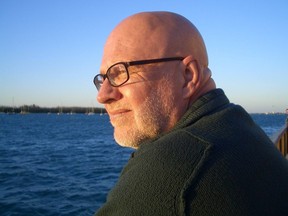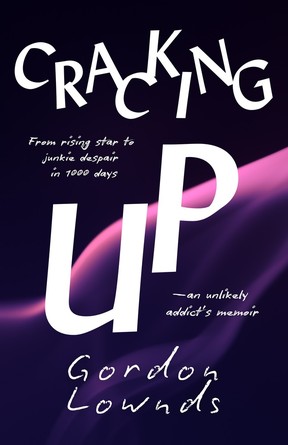'No one is safe': Sleep Country's Vancouver co-founder documents fight against crack addiction in memoir
'I functioned very well, but I was always high ... I was able to carry it off until I could no longer handle the stress of it.' — Gordon Lownds

Article content
Reviews and recommendations are unbiased and products are independently selected. Postmedia may earn an affiliate commission from purchases made through links on this page.
Three decades ago, Gordon Lownds was living the entrepreneurial dream as a successful co-founder of the burgeoning Sleep Country business. At the same time, his personal life was a nightmare.
While the then 48-year-old was in the midst of expanding the mattress business from a handful of stores in Vancouver to over a dozen across Canada, he was battling a full-blown crack cocaine addiction.

Divorced at the time and with his family back in Toronto, Lownds got mixed up with Annabelle, a Seattle stripper with an out-of-control coke habit and libido that never quit. One day, during yet another huge fight about Annabelle getting clean, Annabelle asked Lownds to smoke crack in a bid to better understand the grip it had on her. Lownds did. And he liked it.
Six months later, he had moved from smoking crack to shooting up.
After three years and $700,000 spent on drugs, Lownds decided he could no longer keep up the double life. He left Vancouver and signed in to a rehab facility in Toronto.
Lownds, now 77, tells his high-speed, hedonistic and often harrowing story in his new memoir Cracking Up.
“What shocked me was that I couldn’t control it, I couldn’t stop it on a dime, and I thought I would be able to. Talk about sort of a gut punch, because I’ve always been in control, able to solve problems,” said Lownds, who now lives in Black Creek on Vancouver Island.
“I’ve had a bit of a riotous life, but nothing has ever sort of affected me in a significantly difficult way that I couldn’t cope with it. All of a sudden, I’ve got this problem that I just have no clue what to do, and it’s taken control.”
Lownds first wrote Cracking Up a quarter of a century ago within two years of getting sober.
“I basically did it as sort of a cathartic sort of exercise, just to get my demons out on paper,” said Lownds. “I didn’t intend to publish it, for two reasons. One, my daughter was 17 years (old) at the time, and I didn’t want her to have to suffer through that coming out in the public. And I was concerned about the impact that it might have on Sleep Country. I didn’t want to mess up any sort of reputation of the company, so I just put it on the shelf.”
What changed all these years later was Lownds was introduced to a publisher by a friend, and the publisher encouraged him to revisit his manuscript. With that in mind, he checked with his daughter, and she said yes. He also reached out to his Sleep Country co-founders Steve Gunn and Christine Magee. The trio sold Sleep Country in 1999 for $90 million. Lownds said, after it was all said and done, he made over $20 million. The three remained friends and Gunn and Magee even invested in Lownds’ next venture, ListenUP! Canada, a hearing aid company that he began in 2003. The company expanded to 120 stores before Lownds sold the company in 2012. Last October, Sleep Country was sold to Fairfax Financial for $1.7 billion.
“I spoke to both Steve and Christine last summer about putting the book out. I just wanted to make sure that they didn’t have any concerns about it.
“And they said, no, no, go ahead, it’s 30 years later. There’s nothing bad that can come back on Sleep Country,” said Lownds.
The result is an unflinchingly honest, gritty and gripping cautionary tale about the damage drugs can have on anyone.
“What I found out when I started going to 12-step meetings is that, I would say, 90 per cent of the people in the meetings are not living on the street. So, they’re normal people in very normal family situations, work situations,” said Lownds.
What makes this story more interesting is that Lownds, despite his excessive use, was able to keep his drug use a secret from his colleagues.
“It was stunning to me at the time,” said Lownds. “There’s a phrase that they use called a high-functioning addict. And basically, I was the extreme of that,” said Lownds.
“The way I like to explain it is, I was a high-functioning addict, which means I functioned very well, but I was always high … I was able to carry it off until I could no longer handle the stress of it.”
Terrified that people he worked with would find out, he decided to take a leave of absence and dry out. That leave was a mistake.
“I thought between May and September I’d be able to get my act together, and it just got worse as opposed to better. Because I didn’t have to worry about hiding stuff,” said Lownds.
Eventually, Lownds came clean with his partner, Gunn. Luckily for Lownds, Gunn was understanding and offered his support.
After three months in treatment in Toronto, Lownds returned to tie up loose ends in Vancouver. That too was a mistake, as Lownds’ return to the scene of his drug-addled life and a trashed apartment triggered him and led to relapse. He corrected quickly and got back into the care of a psychiatrist and dove deep into the world of 12-step meetings.
With the book released, Lownds hopes those who read it will gain an understanding of the pervasiveness of drug addiction.
“I’m hoping that people (get the) message that this could happen any time, to anyone, in any sort of walk of life. No one is safe,” said Lownds.
Dgee@postmedia.com
















Postmedia is committed to maintaining a lively but civil forum for discussion. Please keep comments relevant and respectful. Comments may take up to an hour to appear on the site. You will receive an email if there is a reply to your comment, an update to a thread you follow or if a user you follow comments. Visit our Community Guidelines for more information.